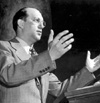Milton Grafman: Difference between revisions
mNo edit summary |
No edit summary |
||
| Line 1: | Line 1: | ||
[[Image:189Grafman.jpg|right]] | [[Image:189Grafman.jpg|right]] | ||
'''Milton Louis Grafman''' (born [[April 21]], [[1907]] in Washington D. C. - died [[May 30]], [[1995]]) led [[Temple Emanu-El]] from [[1941]] until his retirement in [[1975]]. | |||
Grafman | Grafman spent his boyhood in Pittsburgh, Pennsylvania, where he studied at the public schools and at the University of Pittsburgh. He entered the University of Cincinnati in [[1926]] and earned his Bachelor of Arts. From there he went on to Cincinnati's Hebrew Union College in [[1933]], after which he served as rabbi for a congregation in Lexington, Kentucky until [[1941]]. | ||
Grafman arrived to take up the pulpit at Temple Emanu-El in [[Birmingham]] on [[December 7]], [[1941]]. During his tenure he joined the group of clergymen that attempted to defuse racial tensions during the [[Civil Rights movement]]. They criticized the city's [[segregation laws]] and [[George Wallace]]'s [[1963]] inaugural speech calling for "segregation now, segregation forever." | |||
But the clergymen also irritated civil rights leaders later that year by asking [[Martin Luther King, Jr]] to delay demonstrations in Birmingham and wait for the courts to act against racial discrimination. He co-signed the open letter, "[[A Call for Unity]]" to which Dr King responded with his "[[Letter from Birmingham Jail]]". | |||
Rabbi Grafman was survived by his wife of 64 years, Ida Weinstein and two children, Ruth and Stephen, | Rabbi Grafman continued to lead Temple Emanu-El until his retirement in [[1975]]. He died twenty years later, and was survived by his wife of 64 years, Ida Weinstein and two children, Ruth and Stephen. | ||
{{DEFAULTSORT:Grafman, Milton L.}} | |||
[[Category:1907 births]] | |||
[[Category:1995 deaths]] | |||
[[Category:Rabbis]] | |||
[[Category:Civil rights figures]] | |||
Revision as of 00:23, 14 October 2007
Milton Louis Grafman (born April 21, 1907 in Washington D. C. - died May 30, 1995) led Temple Emanu-El from 1941 until his retirement in 1975.
Grafman spent his boyhood in Pittsburgh, Pennsylvania, where he studied at the public schools and at the University of Pittsburgh. He entered the University of Cincinnati in 1926 and earned his Bachelor of Arts. From there he went on to Cincinnati's Hebrew Union College in 1933, after which he served as rabbi for a congregation in Lexington, Kentucky until 1941.
Grafman arrived to take up the pulpit at Temple Emanu-El in Birmingham on December 7, 1941. During his tenure he joined the group of clergymen that attempted to defuse racial tensions during the Civil Rights movement. They criticized the city's segregation laws and George Wallace's 1963 inaugural speech calling for "segregation now, segregation forever."
But the clergymen also irritated civil rights leaders later that year by asking Martin Luther King, Jr to delay demonstrations in Birmingham and wait for the courts to act against racial discrimination. He co-signed the open letter, "A Call for Unity" to which Dr King responded with his "Letter from Birmingham Jail".
Rabbi Grafman continued to lead Temple Emanu-El until his retirement in 1975. He died twenty years later, and was survived by his wife of 64 years, Ida Weinstein and two children, Ruth and Stephen.
